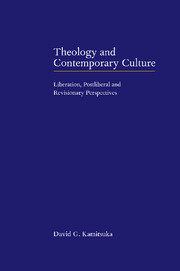Book contents
- Frontmatter
- Contents
- Acknowledgments
- Introduction
- 1 Values informing conceptions of theology
- 2 Apologetics and the linguistic-historical turn
- 3 Credibility in the pluralistic public realm
- 4 Reading the Bible theologically as the church's book
- 5 Pursuing doctrinal common ground
- 6 Virtues and vices in theological practice
- Select bibliography
- Index
3 - Credibility in the pluralistic public realm
Published online by Cambridge University Press: 29 September 2009
- Frontmatter
- Contents
- Acknowledgments
- Introduction
- 1 Values informing conceptions of theology
- 2 Apologetics and the linguistic-historical turn
- 3 Credibility in the pluralistic public realm
- 4 Reading the Bible theologically as the church's book
- 5 Pursuing doctrinal common ground
- 6 Virtues and vices in theological practice
- Select bibliography
- Index
Summary
One cannot read revisionists such as Ogden and Tracy seriously and not feel the proddings of the charge that any “theology that refuses its own need for a fundamental theology is a truncated vision of the fuller task of theology.” Finding problematic understatements and overstatements in the way revisionists construct arguments for the theoretical credibility of Christian beliefs does not relieve critics such as myself from addressing this issue methodologically. New ways are needed to conceptualize what credibility amounts to in today's pluralistic and postmodern public realm. In this chapter, I offer a proposal for this apologetic task based on what has come to be known in philosophical circles as wide reflective equilibrium. This approach brings together the kinds of coherentist and consensus elements outlined in chapter two in an attempt to avoid the understatements about the problematic nature of primordial experience and overstatements about deductive “proofs” which have plagued revisionary apologetics. A wide reflective equilibrium apologetics weaves together a normative presentation of Christian beliefs with a broad range of critical disciplines which test the theoretical and practical validity of those beliefs in light of the changes wrought by the linguistic-historical turn. As such, this apologetic method addresses theoretical and practical concerns under one argumentative umbrella. I contend that this approach, while no panacea for challenges to Christianity from the secular and religiously pluralistic realm, is as rational and practical an approach as one can have in any nonfoundationalist attempt to redeem the credibility of Christian belief and praxis. Furthermore, it is an apologetic method which I believe postliberals and liberationists could – and in some respects already do – endorse.
- Type
- Chapter
- Information
- Theology and Contemporary CultureLiberation, Postliberal and Revisionary Perspectives, pp. 74 - 108Publisher: Cambridge University PressPrint publication year: 1999



